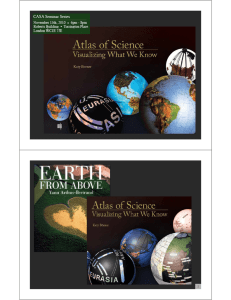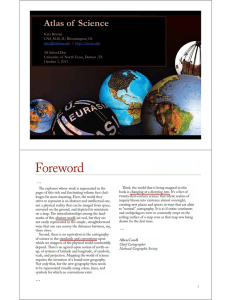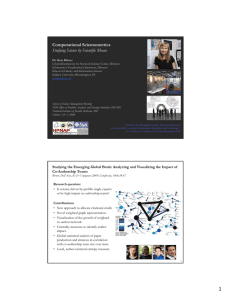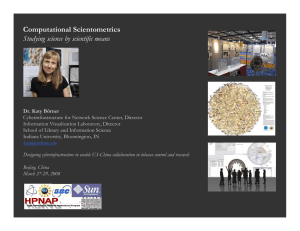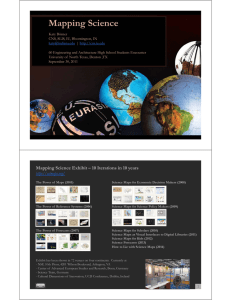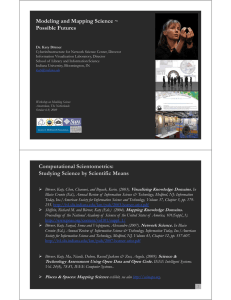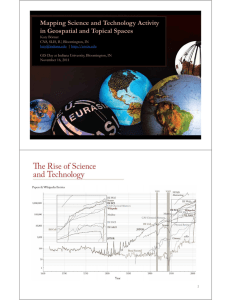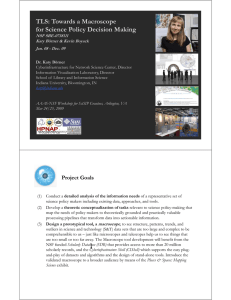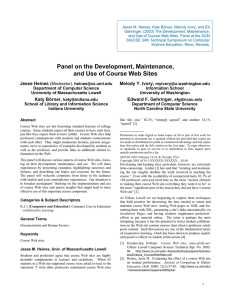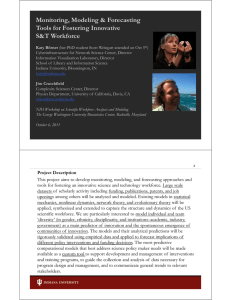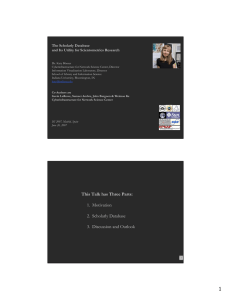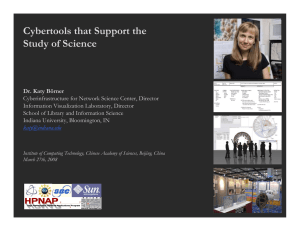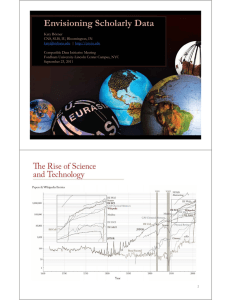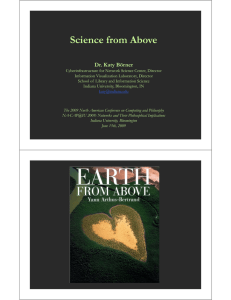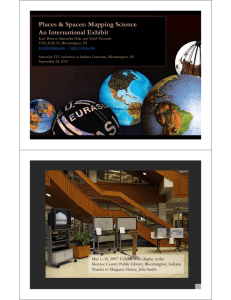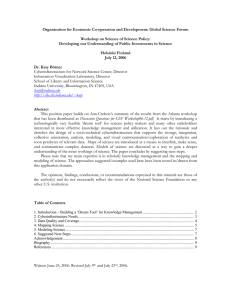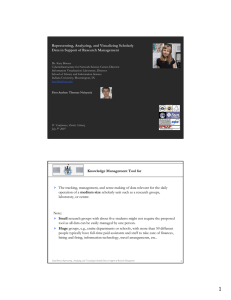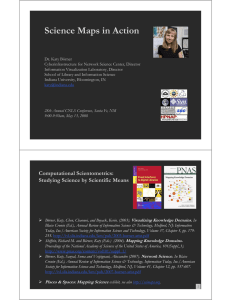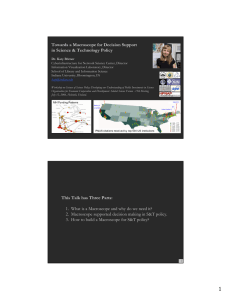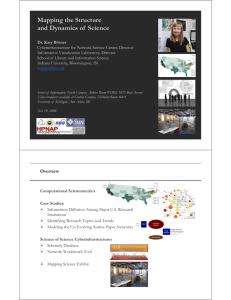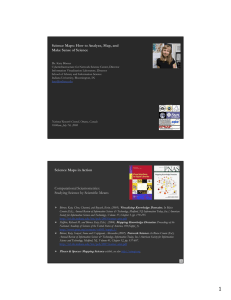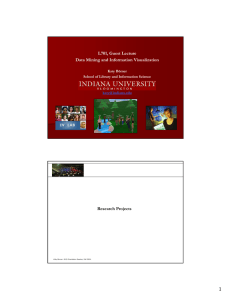Creative Metaphors to Stimulate New Approaches to Visualizing, Understanding, pp g,
advertisement
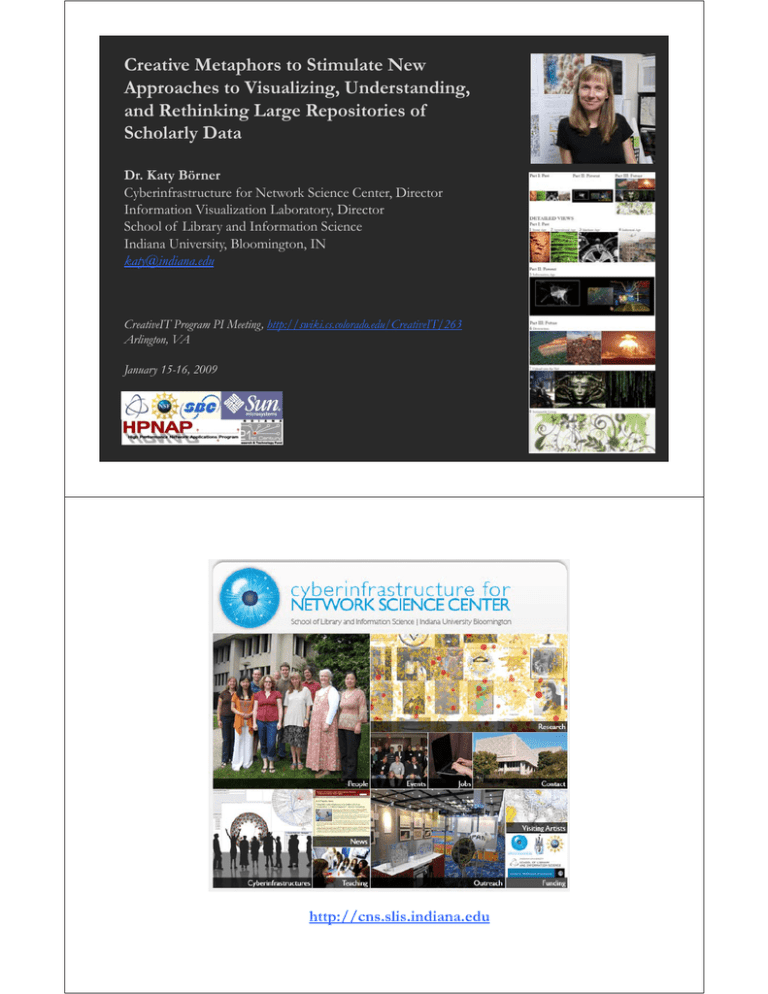
Creative Metaphors to Stimulate New Approaches pp to Visualizing, g, Understanding, g, and Rethinking Large Repositories of Scholarly Data Dr. Katy Börner Cyberinfrastructure for Network Science Center, Director Information Visualization Laboratory, Director School of Library and Information Science Indiana University, Bloomington, IN katy@indiana.edu CreativeIT Program PI Meeting, http://swiki.cs.colorado.edu/CreativeIT/263 Arlington VA Arlington, January 15-16, 2009 http://cns.slis.indiana.edu Scholarly Database: Web Interface Search across publications, patents, grants. Download records and/or / (evolving) ( g) co-author,, paper-citation p p networks. Register for free access at http://sdb.slis.indiana.edu Katy Börner: Mapping the Structure and Dynamics of Science 4 Scholarly Database: # Records & Years Covered Datasets available via the Scholarly Database D Dataset #R #Records d Y Years C Coverage updated d d Restricted R i d Access Medline 16,053,495 1898-2008 PhysRev 398,005 1893-2006 Yes PNAS 16,167 1997-2002 Yes JCR 59,078 1974,1979,1984,19 89,1994-2004 Yes USPTO Yes 3,710,952 1976-2007 Yes NSF 174,835 1985-2003 Yes NIH 1,043,804 1972-2002 Yes Total 21,456,336 1893-2008 4 3 Aim for comprehensive temporal, geospatial, and topic coverage. Katy Börner: Mapping the Structure and Dynamics of Science 5 Mapping Science Exhibit – 10 Iterations in 10 years http://scimaps.org/ The Power of Maps (2005) Science Maps for Economic Decision Makers (2008) The Power of Reference Systems (2006) Science Maps for Science Policy Makers (2009) S Science Maps ffor S Scholars (2010) Science Maps as Visual Interfaces to Digital Libraries (2011) Science Maps for Kids (2012) Science Forecasts (2013) The Power of Forecasts (2007) How to Lie with Science Maps (2014) Exhibit has been shown in 49 venues on four continents. Also at - NSF, 10th Floor, 4201 Wilson Boulevard, Arlington, VA. - Chinese Academy of Sciences, China, May 17-Nov. 15, 2008. - University U i i off Alb Alberta, Ed Edmonton, C Canada, d N Nov 10 10-Jan J 31 31, 2009 - Center of Advanced European Studies and Research, Bonn, Germany, Dec. 11-19, 2008. 6 Illuminated Diagram Display W. Bradford Paley, Kevin W. Boyack, Richard Kalvans, and Katy Börner (2007) Mapping, Illuminating, and Interacting with Science. SIGGRAPH 2007. Questions: p Who is doingg research on what topic and where? What is the ‘footprint’ of interdisciplinary research fields? p have scientists? What impact Large-scale, high resolution prints illuminated via projector or screen. Interactive touch panel. Contributions: Interactive, high resolution interface to access and make sense of data about scholarly activity. 7 Computational Scientometrics: S d i S Studying Science i b by S Scientific i ifi M Means Results are frequently communicated via ‘Science Science Maps’ Maps . Börner, Katy, Chen, Chaomei, and Boyack, Kevin. (2003). Visualizing Knowledge Domains. In Blaise Cronin (Ed.), Annual Review of Information Science & Technology, Medford, NJ: Information Today, Inc./American Society for Information Science and Technology, Volume 37, Chapter 5, pp. 179255 http://ivl.slis.indiana.edu/km/pub/2003-borner-arist.pdf 255. http://ivl slis indiana edu/km/pub/2003-borner-arist pdf Shiffrin, Richard M. and Börner, Katy (Eds.) (2004). Mapping Knowledge Domains. Proceedings of the National Academy of Sciences of the United States of America, 101(Suppl_1). http://www.pnas.org/content/vol101/suppl_1/ Börner, Katy, Sanyal, Soma and Vespignani, Alessandro (2007). Network Science. In Blaise Cronin (Ed.), Annual Review of Information Science & Technology, Information Today, Inc./American Society for Information Science and Technology, Medford, NJ, Volume 41, Chapter 12, pp. 537-607. http://ivl.slis.indiana.edu/km/pub/2007 borner arist.pdf http://ivl.slis.indiana.edu/km/pub/2007-borner-arist.pdf Places & Spaces: Mapping Science exhibit, see also http://scimaps.org. 8 http://scimaps.org CreativeIT: Artists in Residence Workshops Communicating Science Dynamics Interacting with Science Dramatizing Science Forecasts Macroscope: A Fusion of Imagery, Dance, and Music That Communicates the Rise of Knowledge A performance work that uses bodily movement, visuals projected on the back of the stage, g and music to communicate to a general g audience: (1) How much mankind’s scholarly knowledge has increased over the last 1000 years, (2) What tools might be useful to access, manage, and utilize what we collectively know, (3) What the current and a desirable future look like. Macroscope: A Fusion of Imagery, Dance, and Music That Communicates the Rise of Knowledge Macroscope: A Fusion of Imagery, Dance, and Music That Communicates the Rise of Knowledge Macroscope Macroscope Ballet Macroscope: A Fusion of Imagery, Dance, and Music That Communicates the Rise of Knowledge g Some of Many Open Questions How might g dancers ‘fly’ through g an information space p usingg a background g roller coaster? Can projected data streams truly ‘attack’ dancers? Could a dancer stand on stage writing a book and then ‘throw’ it up on the screen? Should dancers ‘push’ a projected button right before a new video segment starts? Rather than using electronic sensors attached to dancers and/or musicians to trigger/impact visuals – can we use visual cues to synchronize visuals, dance, and (li ) music? (live) i ? Timeline In January 2010, 2010 four performances of the 30 min piece will be presented as part of the Indiana University Dance Theatre’s annual “Concert” in the Ruth N. Halls Theater, IUB. All four performances will be video recorded. Macroscope: Evaluation Human subject studies with computer scientists and artists. The purpose of this study is to increase our understanding of what happens if: (1) artists are immersed in a scientific environment and are asked to rethink and reinvent the way we conduct our research, the tools we use and design, and the means of communicating results. (2) computer/information scientists are asked to work with dancers, composers, and others to communicate to a general audience - How H much h mankind’s ki d’ scholarly h l l knowledge k l d has h increased i d over the h last l 1000 years, - What tools might be useful to access, manage, and utilize what we collectively know, - What the current and a desirable future look like. What expectations exist in the beginning, how do these expectations change over time, who is contributing what to the end result? How does the (understanding of the) overall goal of the performance piece change? Questionnaires will also be administered with the audience of the Macroscope dance performance – what did they expect, what did they get (love/hate/take away)? Open Issues How to covert the results of this research into publications, citations, download counts, etc.?
